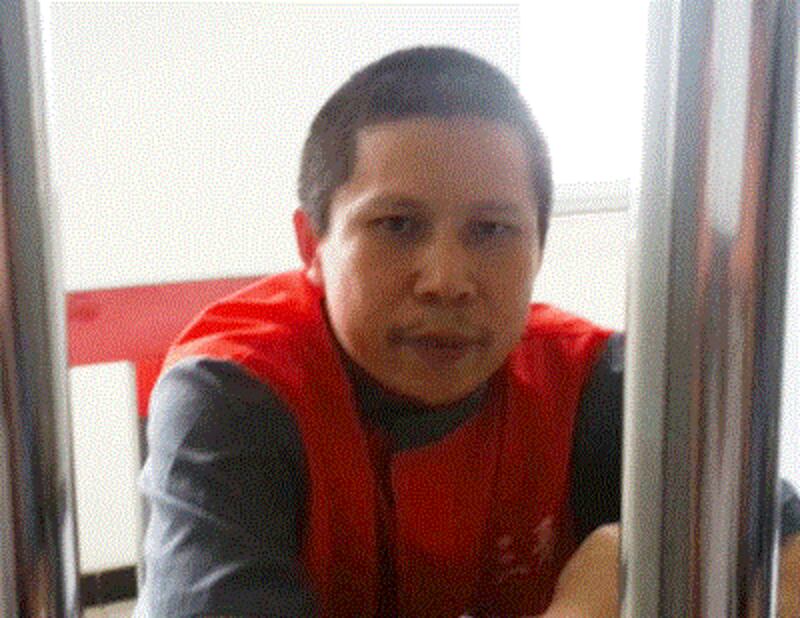Prominent Chinese anti-graft campaigner Xu Zhiyong on Wednesday staged a silent protest at his trial on public order offenses in Beijing, his lawyer said.
The activist's lawyers, Zhang Qingfang and Yang Jinkuang, also refused to speak during the seven-hour trial at Beijing's No.1 Intermediate People's Court, where Xu was charged with "gathering a crowd to disrupt public order."
"In the end, we all maintained silence," Zhang told RFA after the trial, in which a verdict is expected within the next six weeks.
He said no retrial would likely take place, in spite of the silent protest by Xu, a legal scholar and founder of the New Citizens' Movement, a loose network of activists seeking to promote the rule of law and human rights in China.
"We have never recognized the legality [of this trial], so we have no plans for further communication with the court," Zhang said.
Meanwhile, Wang Gongquan, a businessman and big-name tweeter backing Xu, was released on bail after he "confessed" to conspiring with Xu to incite public order, according to a microblog post by the court.
Several other activists linked the New Citizens' Movement are scheduled to go on trial on charges similar to Xu's this week and next.

Security tight
Apart from Xu and his two lawyers, only the activist's wife Cui Zheng was allowed a permit to attend Xu's hearing, in spite of a number of applications from Xu's supporters and one from a European Union official, Zhang said.
Authorities dispatched 10 busloads of police to the court buildings ahead of the trial, as well as large numbers of plainclothes police to patrol streets nearby and question passersby.
Video given to RFA by an eyewitness outside the court showed a group of petitioners kneeling on the ground and displaying placards with demands for justice on them, before being escorted away by uniformed police.
An unidentified news-gathering team who tried to shoot video outside the court was told to leave by police, eyewitnesses said.
Sichuan-based rights activist Chen Yunfei, who was in Beijing for the trial, said he saw several hundred police and plainclothes state security police lining the streets at an intersection near the court building.
Police had cordoned off an area several hundred meters from the court building, Chen said.
"There were police lines and cordons everywhere, both uniformed and undercover," Chen said. "They were checking the documents of people who just wanted to cross the streets."
"I got within about 200 meters, where the authorities had cordoned off the area, then they took me to Jiujingzhuang," Chen said, referring to an unofficial detention center on the outskirts of Beijing used for holding petitioners and sending them back to their hometowns.
"But they said they wouldn't accept me because I'm not a petitioner, so they sent me right back again," he said.
"The police outside the court were being very rough when I got back there in the afternoon, and I saw them treating foreign journalists very rudely, telling them to go away and grabbing their footage," Chen said.
He said police had confiscated some leaflets supporting Xu that he took with him to the court.
Petitioners rounded up
Jilin petitioner Xu Fengru said she was among dozens of petitioners rounded up by police outside the court.
"There were plainclothes cops and police vehicles everywhere," Xu Fengru said. "We really wanted to know what was going on, so we asked around at the scene."
"Xu Zhiyong was trying to overturn injustice, and we have suffered injustice too," she said.
She said Xu had a following among petitioners in Beijing, because he used to hand out donated food and clothing to petitioners who were homeless in the capital.
China's army of petitioners—who file 20,000 grievances in person every day to complaints offices across the country, according to official figures—say they are repeatedly stonewalled, detained in "black jails" like Jiujingzhuang, beaten, and harassed by the authorities.
Call to reveal assets
Xu was detained by Beijing police in July last year in a crackdown on activists who have called on government leaders to declare their assets.
But his formal indictment came last month, on the eve of United Nations International Anti-Corruption Day. In it, Xu was accused of organizing and gathering a crowd to call on officials of the ruling Chinese Communist Party to disclose their assets.
According to Beijing police, Xu hung banners calling for asset disclosure and equal access to education, creating "serious disturbances in public order in public places," and interfered with the work of public security officials.
Wang, a popular social media activist, was detained in September and formally arrested on public order charges in October after he used his account on the Sina Weibo microblogging service to support civil rights campaigns.
Repeated calls to Wang's cell phone resulted in a switched-off message on Wednesday.
The authorities have detained at least 50 activists who have called on China's leaders to reveal details of their assets since March, the New York-based Human Rights Watch said in its annual report this week.
Reported by Wen Yuqing, Hai Nan, and Lam Lok-tung for RFA's Cantonese Service and by Xin Yu for the Mandarin Service. Translated and written in English by Luisetta Mudie.
